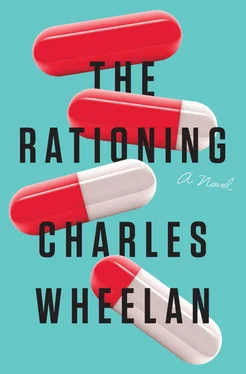The sun had dropped low on the horizon, creating a softer light in the Cabinet Room and reminding us of how long we had been in that room. “Should we stop to order dinner?” the Chief of Staff asked.
“I think we can finish up,” the President said. “I’d like some closure here.”
“Maybe a short break?” the Chief of Staff asked.
“Let me float an idea first to see if we can get some consensus,” the President replied, more genial than usual. “Remember, we are only adopting a contingency plan. We are not recommending a course of action. We can decide what we want to do vis-à-vis China in the morning—or, I guess, by the end of day tomorrow, is that right?” The Chief of Staff nodded yes, and the President continued. “So this would be our recommendation if we have to ration the available Dormigen. We will do everything in our power—everything responsible in our power, I guess I should say—to avoid such a situation. But this would be our plan, should the need arise, yes?”
The House Speaker said, “I still believe this is a decision for Congress. I want that to be clear.”
“You’ve made that abundantly clear,” the President said. “Believe it or not, I agree with you.” The House Speaker looked surprised, and then vaguely suspicious. The President continued, “A decision of this magnitude ought to come from Congress, even if that’s not where the authority over the Dormigen technically resides. On the other hand, I think any discussion in Congress would be longer, more contentious, and less productive than what we’ve been sitting through this afternoon.” The President looked at the House Speaker and then the Senate Majority Leader. “Would you agree?” he asked.
“I think that’s right,” the Senate Majority Leader said.
“What are you saying?” the House Speaker answered, wary of walking into a trap.
“I would propose that this group make a recommendation for Congress to approve. Maybe it’s an up-or-down vote. Maybe there could be some modest amendments. I would leave that to the two of you.”
“What exactly are we recommending?” the House Speaker asked.
“We’re not there yet,” the President said. “This is just about process. I want to agree on a process first.”
“I would be comfortable with that,” the Senate Majority Leader said. “I think it’s a sensible approach.”
“What about China?” the House Speaker asked. “That’s how we make this whole problem go away. There is no need to be rationing anything.”
“China is my decision,” the President said firmly. “Congress has no authority over foreign policy decisions, and, frankly, I don’t have confidence that Congress would be in a position to weigh the long-term implications of our complete capitulation in that part of the world.”
“But you can?” the House Speaker said.
“I don’t have to get reelected,” the President asked.
“Maybe that’s a problem,” the House Speaker said.
The President ignored her and continued, “As I was saying, if we get into a position where we have to ration Dormigen, I would like this group to make a recommendation with regard to how we allocate the available Dormigen, and I would like Congress to ratify that decision, perhaps with modifications—I’ll leave that to the two of you.” He looked first at the Speaker and then at the Senate Majority Leader. The latter nodded in agreement; the Speaker waited warily to hear more. “There is no way Congress can take up this issue from scratch, in a short amount of time,” the President said. “I think the Acting Secretary has made a powerful point here this afternoon, namely that any attempt to ration Dormigen using anything more than the most basic criteria is fraught with problems. If necessary, I propose that we ration Dormigen based on age alone, drawing a cutoff as necessary depending on the size of our shortage.” The President paused and looked around the table to take stock of the room.
After a moment, the Secretary of Defense said, “In my heart, I believe there has to be a better way, but for the life of me I can’t seem to pin it down. I’m persuaded that we ought to keep it simple. I support what you’re proposing.” The others nodded in agreement.
The President continued, “If the plan to ration by age is rejected, either in the courts or by Congress, then I think the only alternative is to use some kind of lottery. We should make that explicit up front.” The President looked to the Speaker and the Senate Majority Leader. “Would you be comfortable taking that to the Congress?” he asked.
“It would be an unnecessary tragedy to get to that point,” the Speaker said.
“One step at a time,” the President said. “I need to be wheels-up for Canberra at about this time tomorrow.”
“I would be comfortable presenting that plan to the Senate,” the Majority Leader said.
“Yes,” the House Speaker agreed.
There was a moment of palpable goodwill in the room, a sense that we had taken a long journey and arrived at our destination. Although the view at the top may not have been as glorious as we had hoped, we were nonetheless standing there together. I began to admire the President’s style. He did not row, he steered. The rest of us thrashed about, hour after hour, as he sat at the end of the table saying relatively little. Then, when the destination was in sight, he pointed toward a spot on shore and urged us to make the last few strokes necessary to get there. The Chief of Staff said, “Thank you, everyone. I know it’s been a long day. We’re going to talk through the China option in the morning—”
The President cut her off, his geniality gone. “We’re not done yet. How bad is it? What’s our death toll?” There was no answer from the table. “From Capellaviridae ,” he added. “I assume we have data on this.”
“Our Dormigen stocks are still robust everywhere,” the Chief of Staff assured him.
“But they’re not going to the hospital,” the President said emphatically, almost yelling. “This family in Hawaii…” He looked to the Director of the NIH. “How many?”
“The data are very rough,” the NIH Director replied. “Any estimate at this point is just an approximation.”
“How many?”
The NIH Director looked at her phone and took a shallow breath. “Somewhere in the range of twelve hundred.”
“Jesus Christ,” the President exclaimed. The collective body language around the table suggested similar shock.
“It’s worse than we thought?” the President asked.
“I wouldn’t say that—not the virus,” the NIH Director responded. “Our behavioral models… we may have overestimated how likely it is that people who fall sick would seek treatment.”
“ Because you’ve covered it up! ” the Speaker yelled. “People don’t know it’s a problem because you’re hiding it from them.”
The President said calmly, “The First Lady made a statement about seeking treatment—”
“Hah!” the Speaker retorted. “I’m sure that’s what the public will remember from that dishonest circus show. You’ve killed twelve hundred people—”
“That’s enough,” the Chief of Staff said.
The Speaker was not to be deterred: “You’ve killed twelve hundred people, and that’s before the Dormigen stocks run out. When that happens, twelve hundred is going to feel like a rounding error. We’re talking tens of thousands of deaths—an American Hiroshima. Tell the American people what is happening, accept the offer from China, and make this problem go away. Anything else is totally irresponsible.”
All eyes around the table turned to the President, who remained silent. Maybe I saw doubt in his eyes; some of the anger appeared to have dissipated. And then, from the other end of the table, “Ninety thousand.” It was the Strategist, reading from his phone. “Hiroshima deaths. Between ninety and one hundred and forty thousand. A lot of it was radiation sickness—”
Читать дальше












